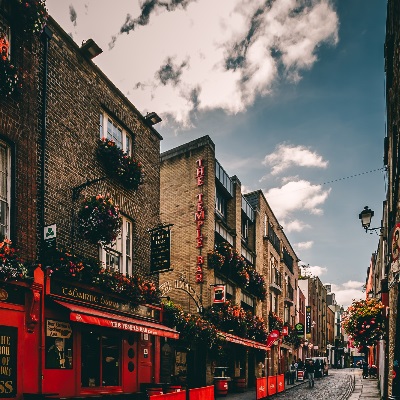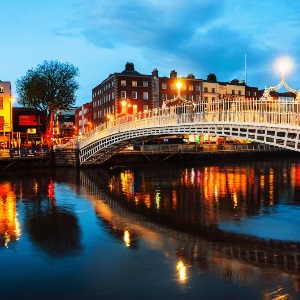Crown Relocations is NZ’s leading moving company.
Let us help you plan your relocation and discover everything Ireland has to offer. Crown are an international relocations company, specialising in international removals, shipping, storage, overseas moving, movers insurance, relocation services and lots more. We will even relocate your vehicle and pets!
Our friendly team are available to answer any relocation questions you may have. Call: 0508 227 696 or email [email protected]

Ireland also known as Northern Ireland, is a part of the United Kingdom in the north-east of the island of Ireland. Northern Ireland shares a border to the south and west with the Republic of Ireland. It is home to over 1.8 M people contributing about 3% of the entire population in the UK.
The geography of Ireland comprises relatively low-lying mountains surrounding a central plain, with several navigable rivers extending inland. The Irish climate is influenced by the Atlantic Ocean and thus very moderate, and winters are milder than expected for such a northerly area, although summers are cooler than those in continental Europe.
English and Gaelic or Irish as it’s known locally are the two official languages spoken in Northern Ireland. Irish is a Celtic language and one of “the oldest and most historic written languages in the world”.
Northern Ireland shares both the culture of Ireland and the culture of the United Kingdom. Wherever you go you will discover an abundance of cultural expression. The Irish summer is awash with festivals celebrating everything from flowers in bloom to high literature.
Whether you’re moving to the capital of Dublin or to Cork, Galway or Belfast Crown Relocations can help every step of the way!
If you are a member of the European Union (EU) or the European Economic Area (EEA), then you do not need a UK-specific work permit or visa. If you are not a member then you must apply for the relevant work permit or visa before you arrive in the UK — this can be done through your local UK embassy.
New Zealand passport holders may generally enter the UK for six months without a visa on a visa waiver if they are here for a holiday. However, they will still need to satisfy a Border Force officer (UK Customs) when they arrive that they meet the requirements of a visitor category, and aren’t in the UK for any other purpose.
While New Zealanders generally do not need a visa before entering the UK on holiday, there are circumstances when you may need to obtain one before you travel. To live, study and work in the UK you must obtain the necessary visa before you arrive in the country. These visas can only be applied for from your country of residence; this will likely be New Zealand for most New Zealanders. For details of visa and general immigration enquiries, visit the UK Home Office Visas and Immigration page.
The local currency of the UK is the Pound Sterling. Shops and service providers, as a rule, only take sterling. Coins come in denominations of 1p, 2p, 5p, 10p, 20p, £1 and £2 while notes come in £5, £10, £20, £50 and £100, although some of the larger shops will take Euros (the official currency of the European Union).
Many migrants have found it helpful to set up a UK bank account before arriving in the country. This makes it easy for converted money to be transferred straight in to your account, as well as minimising the need to carry cash while travelling. There are many banks in Glasgow who offer an easy, online sign-up service.
The best way to convert large sums of money is through online transferral companies, who provide a much cheaper rate.
Crown has entered into a partnership with OFX to provide an easy, reliable and cost effective solution for clients who are moving their funds internationally. The deals offered by OFX are at super competitive exchange rates and in most cases there’s no fee. The cost structure is so good that the saving you make may even pay for the entire cost of your relocation. Visit the OFX website for more information.
It’s easy to get around Ireland as it has good public transports with a range of concession passes to choose from. The motorways and railway networks provide easy connections between major towns and city centres; and if you need to cross the border to anywhere in the UK or further afield, there are three airports and two major seaports, and a great passenger railway system to serve your travel needs.
Members of the EU and those from Commonwealth countries are eligible to drive in the UK for up to twelve months, assuming that they hold an up-to-date license. This includes those from; Australia, Barbados, British Virgin Islands, Canada, Falkland Islands, Hong Kong, Japan, Monaco, New Zealand, Singapore, South Africa, Switzerland and Zimbabwe.
An overseas license can then be exchanged any time within five years for a GB (Great Britain) version.
Education in Northern Ireland differs from systems used elsewhere in the United Kingdom, although it is relatively similar to Wales. A child’s age on 1 July determines the point of entry into the relevant stage of education, unlike England and Wales where it is 1 September. Children attend primary school between the ages of 4 and 11. At age 11 pupils transfer to secondary education.
Publicly funded secondary education is provided in secondary schools or grammar schools. Entry to grammar schools is through academic selection and grammar schools set their own transfer tests and invite pupils to sit these tests in their own schools. At age 16 students sit their GCSE examination which also marks the end of compulsory education. Most students either transfer to sixth form at secondary school, or grammar school, or a Further Education College to study A-levels or vocational qualifications and training.
There are six regional further education colleges and three universities in Northern Ireland. A wide range of courses are provided including essential skills, vocational and academic programmes as well as some Higher Education courses.
The quality of education at public schools in Ireland is fairly high, and many expat children attend them. Public school education is provided free of charge, but parents are usually expected to pay for uniforms, school books and extra-curricular activities.
Crown can arrange an appointment with a Specialist Education consultant who can provide an in-depth explanation of local education systems, the curricula available and arranging interviews, as well as assist with enrolment requirements. Please contact us for information and rates.
Public healthcare is provided by Health and Social Care of Northern Ireland (HSC), a branch of the National Health Service (NHS). While the HSC is run separately from the NHS, many of its features are shared. The quality of public healthcare in Northern Ireland generally is good with free medical treatments available to all legal residents.
To receive medical treatment in Northern Ireland, expats will need a medical card from the HSC. Expats may obtain this when registering with a General Practitioner (GP) for the first time.
Private medical facilities are of a high standard here, but usually only offer specialised care or services not covered by the Health Service. Private healthcare can be expensive, so having a private health insurance is a good idea especially to cover dental and eye care; and other specialised medical treatments at a private facility.
If the insurance company you were with in New Zealand is a member of the International Federation of Health Funds, you may be able to transfer your policy to the UK without penalty – at a similar level of cover. Check with your insurance provider for details.
When choosing where to live in Ireland, the deciding factor for expats is normally how close you need to be to your place of employment and school. The cost of accommodation and commuting to work are also significant considerations. Comparing its nearby neighbours in Dublin and London, Belfast boasts some of the lowest accommodation costs in the UK. The average house price in Belfast is almost half the UK’s average house price.
Looking for a home in Ireland can quite often be a daunting task, Crown provides accommodation information for rental or purchase properties and can also arrange for temporary accommodation.
One of the great things about Ireland is the number of meet-ups that have developed over the last few years. If you’re moving there for work, there will also be meet-ups that will suit your professional needs, and you won’t be short of friendly people to talk to.
Expatriates most commonly assimilate in to the community through pursuing sports and hobbies they are interested in. There are a number of established expatriate communities that new migrants can join.
Social media and activities such as volunteer work, sports teams, and foreign language classes are all great ways to get to know like-minded people in your area.


Crown Relocations has 55 years of experience moving individuals and families to Ireland and throughout the UK, contact us today for more information about our services. Read our blog Expert Tips on Moving to the UK for move information.
To arrange a quotation call our office for an obligation FREE quote on: (NZ) 0508 227 696 or you can use our online quote form.


Hi there, you’ve reached us outside of business hours. Please leave your name and number and we’ll be in touch with you soon.
Hi there, you’ve reached us outside of business hours. Please leave your name and number and we’ll be in touch with you soon.